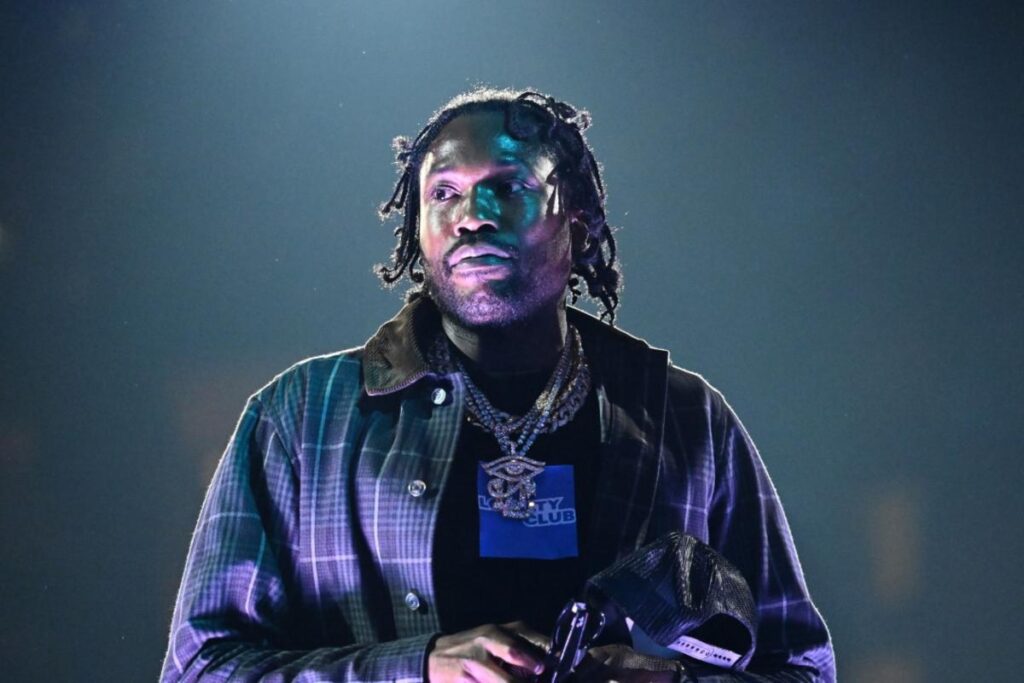Home Front’s Watch It Die doesn’t just shift between genres, it lives in the tension between post-punk bite and ’80s new-wave shine. The album is built on an internal tug-of-war where melody and menace constantly battle for control. There’s almost a Dr. Jekyll and Mr. Hyde feeling to the sonic logic of Watch It Die: instead of neatly dividing the record and allotting each song a distinct sound or dissolving the genre barrier entirely by fusing both styles into something all its own, Home Front lets the warring instincts of synth-pop polish and punk ferocity occupy the same body, and (much like in Stevenson’s famed novella) that coexistence can’t come without some conflict.
The band pulls from the two corners of their sound in a way that feels internal rather than structural, with bright new-wave melodies rising just long enough for a blast of bar-room punk energy to knock them off balance. These shifts aren’t decoration or easy nostalgia plays. They are extensions of the album’s core tension, the push and pull between clarity and chaos that runs through every track. The more reflective, melodic moments expose the record’s uneasy undercurrent, while the harsher eruptions turn that discomfort outward, giving the album its bite. Taken together, the constant back-and-forth becomes the point: a restless, lived-in conflict that sets the stage for the rage, dread, and broader social unease the band wrestles with throughout Watch It Die.
Bandleader Graeme McKinnon channels the discord in the way he delivers each line, shifting between vulnerability and fury with a seamless ease that weaves the band’s split impulses into a single cohesive tapestry, one that depicts a world where everyone seems to be teetering on the edge of their own breaking point—a world, in other words, much like our own. There are, fittingly, tracks like “New Madness” and “Always This Way” are driven by Peter Hook-style basslines and rough-edged riffs where Home Front lean hardest into their punk bite. But, throughout, McKinnon surrounds himself with sidemen who fully realize the album’s softer side as well: all bright, atmospheric guitar lines and tight synth-and-drum arrangements that could stand toe-to-toe with Tears for Fears’ “Shout.”
That contrast comes into full focus on songs like “Between the Waves” and “Kiss the Sky,” which could pass for forgotten John Hughes soundtrack staples. Most of all, late album entry “Dancing With Anxiety” plays like the point where the record’s split personalities finally bleed together, using Talking Heads-style structure and Home Front’s abrasive vocal edge to merge the reflective and chaotic sides into one jittery standout. But it’s the lyrical focus that ties everything together: “There’s gotta be a way to stop the bleeding,” McKinnon sings on lead single “Light Sleeper,” “and I’ve known this anger since the day I knew my name.”
Anger and its lack of resolution looms heavily over Watch It Die. McKinnon’s lyrics draw you in, empathetically showing a mind trapped in its own turmoil: from the outside, the way forward seems simple, but inside the headlock of rage, nothing is clear. The record opens with a sample from the 1978 film Killer of Sheep, where actress Kaycee Moore pleads, “Why do you always want to hurt somebody?” Her husband, played by Henry G. Sanders, replies, “That’s just the way nature is.” The exchange mirrors the album’s own Jekyll-and-Hyde logic: half the songs ask Moore’s question, searching for understanding, while the other half deliver Sanders’ resigned answer, embracing the “fuck you, leave me alone!” energy. By framing this through a cinematic sample, Home Front underscores the theatrical, almost filmic quality of their music, as if Watch It Die itself were a dialogue played out across sound and emotion.
On the “Hyde side,” so to speak, the punk-infused tracks confront rage and chaos head-on. “Light Sleeper” serves as a solid post-punk transition, while songs like “For The Children (F*ck All)” unleash shout-along fury with razor-sharp hooks. Tracks like “New Madness” and “Young Offender” lean the heaviest into Home Front’s punk side, with Oi-inspired post-punk energy, pub-singalong hooks, and slurred aggression that hit immediately and leave a mark. Those songs are much more aligned with Home Front’s 2023 debut Games of Power and its lead single, “Nation,” when the band leans into Oi-inspired post-punk pub singalongs—anthems delivered with slurred aggression. It’s not hard to imagine UK tough-guy actor Vinnie Jones in his Eurotrip-era football hooligan mode, stomping around as Mad Maynard. The aggression here is deliberate, visceral, and cathartic—these songs thrive on immediacy, using raw energy to channel anger and frustration.
Lyrically, Home Front takes aim at political hypocrisy, calling out a government that promises equality and growth while being built on a foundation of blood and neglect. There’s even a nod to the perceived downfall of the American system, as if they’re watching it all unfold from the outside, powerless to intervene. It’s hopeless, bitter, and unflinchingly honest—like yelling at a wall, knowing the bricks won’t hear a thing. The intensity and immediacy of these songs make them the record’s unmistakable moments—the ones you can’t ignore, the moments that stick with you after the album ends.
By contrast, the softer, more reflective tracks—the “Jekyll side,” if you will—don’t hit with the same immediacy. “Between the Waves” bathes itself in moody textures and lasering 303s, while “Eulogy” contemplates mortality, McKinnon leading a somber rallying cry: “To all our friends gone too soon: It comes for me, it’ll come for you.” “The Vanishing” continues this introspection, reflecting on the slow drain of daily labor—“I work Monday to Friday, the nation owes me a living”—set against twinkling synths and gentle acoustic chords. These tracks don’t attack with a visceral force, but they are carefully constructed meditations, giving the album its depth and emotional weight. From the outside, they might feel mellower than the punk songs, yet their subtlety and moodiness stand on their own and provide a necessary counterbalance to the album’s aggression. They work well within the album’s conceptual framework, providing depth and texture, exploring the ‘80s-inspired synth-pop and new wave motifs the band has toyed with in the past. They aren’t filler; they’re thoughtfully structured and often quietly compelling, but when paired against the punchy punk anthems, they don’t leave the same lasting impression. That’s the compelling, sometimes frustrating juxtaposition of Watch It Die: the Jekyll and Hyde balance gives the album richness, yet it also sets up a hierarchy of impact, where the punk tracks dominate the memory even as the softer songs quietly bolster the emotional and thematic core.
The record is at its sharpest when it’s direct, like in the deliberately provocative “For the Children (F*ck All),” where McKinnon turns harsh truths into radioactive hooks: “Fuck all is all that’s left for us.” Watch It Die’s political edge comes from Home Front’s clear frustration with the Canadian government, calling out the gap between its glossy promises and the grim reality underneath. There is a heavy nihilism here, a sense that the system is too far gone to fix, that speaking truth to power is just more yelling into the void. Yet even with all that unrest hanging over the record, the politics take a backseat to the introspection. They shape the mood, but the real story is McKinnon staring down the internal fallout of living through it, and it’s the human impact there that makes it hit home. Yet, much like its exploration of rage, there’s little resolution, and that ends up working in the album’s favor. The lack of clarity feels intentional, a reflection of how anger can just sit in your chest with nowhere to go. When it closes on “the sun never sets,” you’re left in that same loop of unrest without change—and that, perhaps, is exactly the point.




